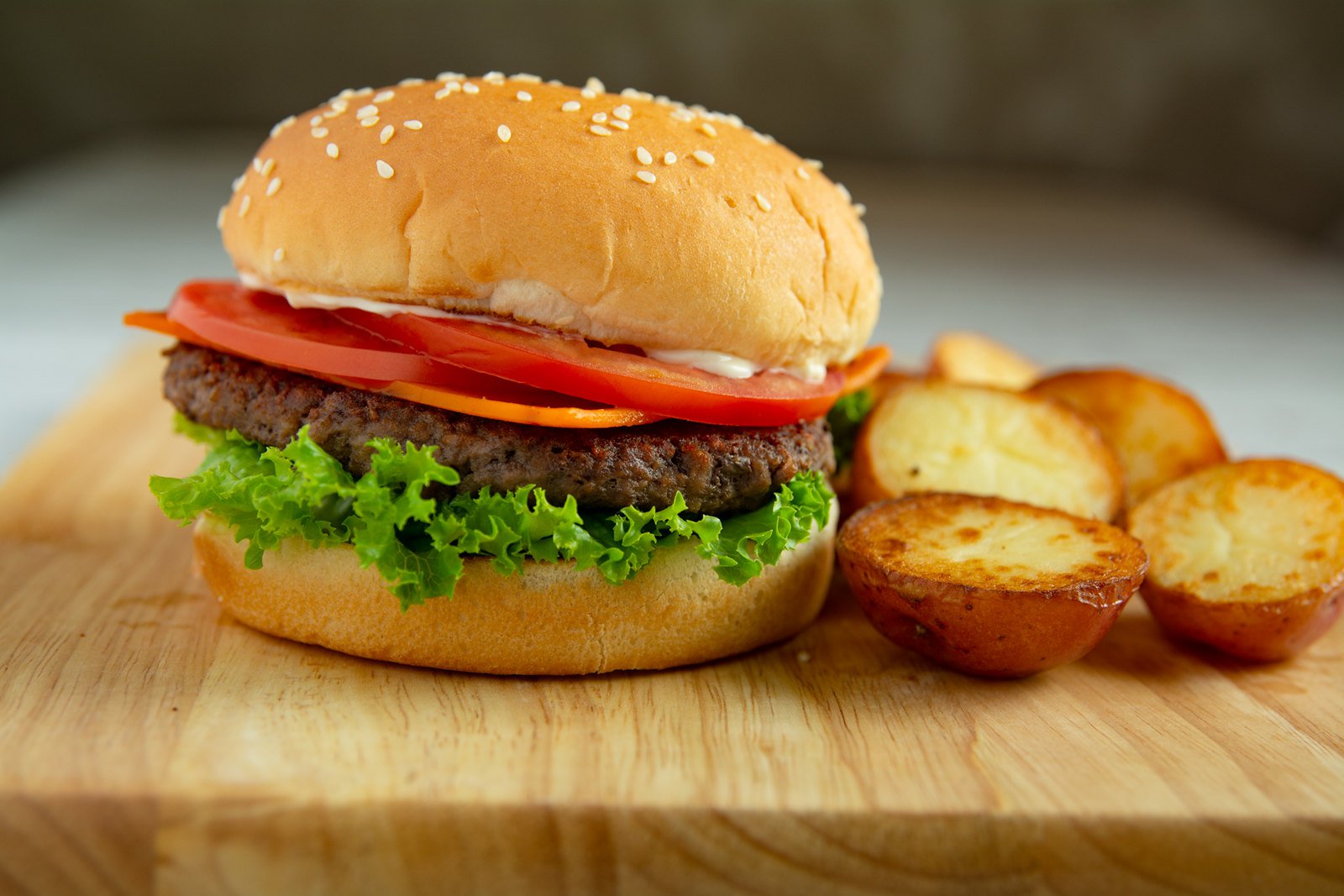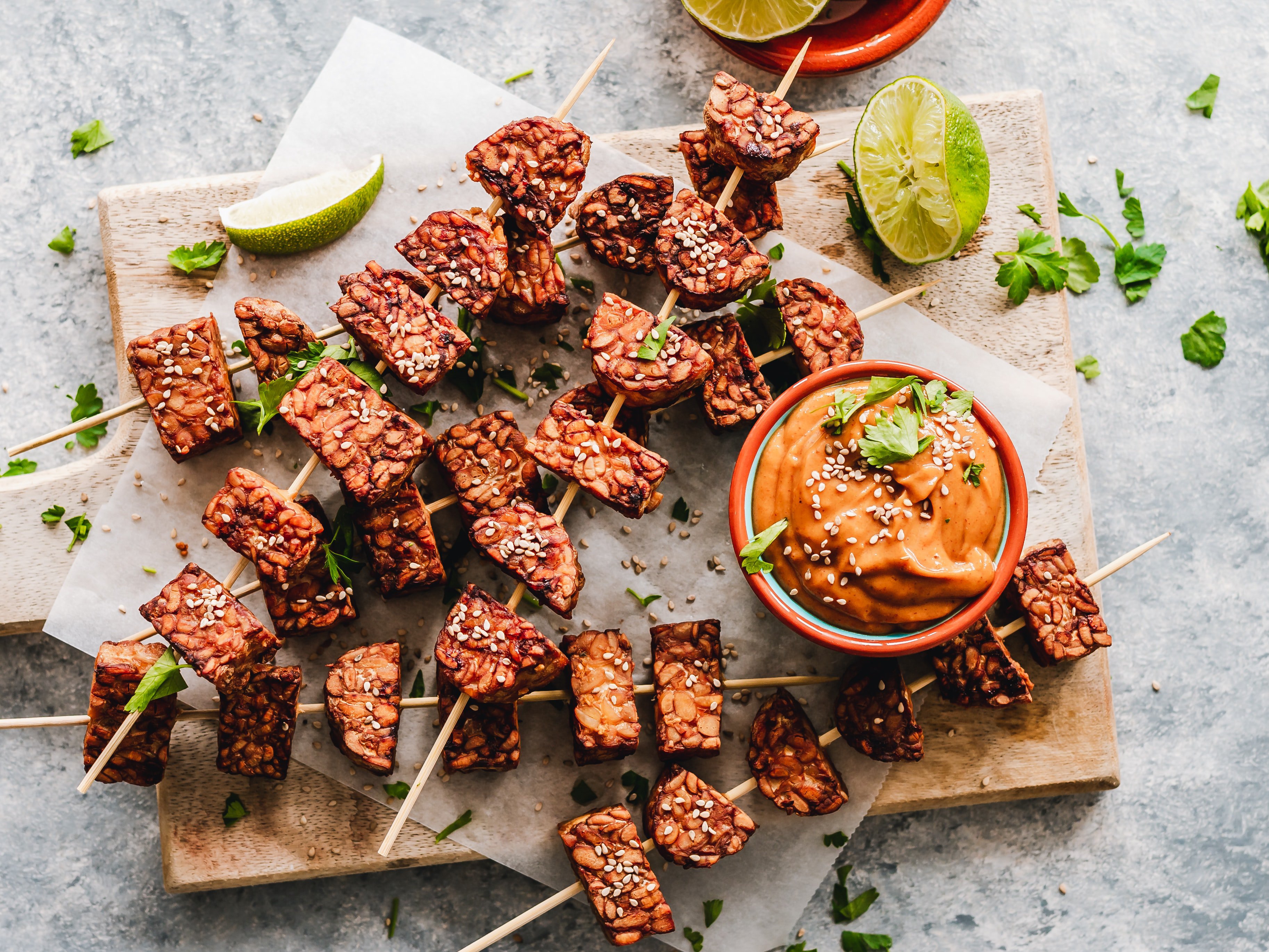Gallons of Water Used to Make a Beef Burger Vs Impossible Burger
Why Global Citizens Should Care
Transitioning to a plant-based diet can significantly improve the health of the planet. The United Nations is urging countries to phase out dairy and meat production to mitigate climate change and improve food production systems. You can join us in taking action on related issues here.
Eating hamburgers with your friends for lunch isn't going to destroy the planet — the environmental impact of beef comes from the scale of its production and consumption worldwide.
But the scale has gotten so out of control that all meat eaters — particularly people in wealthy countries — have a role to play in shifting the global food system.
In the US alone, the average person eats the equivalent of about 2.4 quarter-pound patties per day, according to Quartz. Between 1998 and 2018, global beef consumption increased by 85%, with most of this growth coming from China's exploding meat market. As burger demand grows, beef production is expanding, a trend that has catastrophic implications for the planet.
Beef production is one of the leading causes of climate change and environmental degradation worldwide. Livestock release methane into the atmosphere, a greenhouse gas that's 30 times more effective at trapping heat as carbon dioxide. Feeding billions of cows requires vast areas of forest and grassland to be cleared, which threatens tropical forests and biodiversity. Livestock also eat around 34% of global crop production and consume nearly one-third of all freshwater.
This ecological footprint will only grow in the years ahead unless countries invest in restorative agriculture and people everywhere transition to a predominantly plant-based diet, according to the United Nations.
The good news is that there are a lot of tasty plant-based burger alternatives that are without exception better for the environment, according to the Sierra Club. You also don't have to eat burgers of any kind — as a rule, other meals tend to have lower environmental impacts than the burger. The Sierra Club found that each quarter-pound burger is responsible for 12.4 pounds of greenhouse gas emissions, 153 gallons of water, and 57.5 square feet of land.
But if you have a hankering for a burger, the plant-based options out there do vary in terms of their environmental impact.
Here's a brief breakdown of the environmental impact of common vegan burgers.
Impossible Burger

Impossible Foods wants to completely replace traditional hamburgers with its soy-based patties that taste remarkably similar to beef and offer a greater consistency of taste. The Impossible Burger is sold around the world and can be found at fast-food chains like Burger King (although these fast-food options are not always truly vegan) and grocery stores like Wegmans.
But how does the so-called "vegan whopper" impact the environment?
The Sierra Club found that its ecological footprint is substantially less than a beef burger across the board. A single patty, according to their findings, accounts for 12 times less greenhouse gas emissions, nearly 50 times less water use, and roughly 20 times less land use.
In comparison to beef, Impossible Burgers are unquestionably better for the environment — but they still have an impact, especially since the company currently depends on the industrial production of soy. Industrial agriculture in general is destructive for the planet, so anything that contributes to it should be avoided if possible.
"By producing these burgers on a massive scale for cheap, these companies are supporting a plant-based food system — but one that relies on monoculture rather than a diversified crop system," the food writer Alicia Kennedy wrote for In These Times. "Diversifying crops is crucial to soil and wildlife health and helps keep small farmers in business.
Beyond Burger
 Beyond Burger (foreground) cooking on the grill alongside beef burgers.
Beyond Burger (foreground) cooking on the grill alongside beef burgers.
Beyond Meat is also competing to displace beef burgers and the company makes a whole array of meat alternatives, from chicken nuggets to breakfast sausages. Their juicy burgers made mainly from pea protein have helped the company's market share grow exponentially.
Beyond Burgers account for roughly the same amount of greenhouse gases as Impossible Burgers. They use four times less water to make, but require 50% more land than Impossible Burgers, according to the Sierra Club.
The same critique of industrial production can be leveled at Beyond Meat as well. By relying on industrial agriculture, the brand perpetuates a food system that's harming the planet. But like Impossible Burgers, Beyond Burgers are substantially better for the environment than beef burgers. They also taste pretty similar to beef, so if you have a craving for a burger, it's not a bad option.
Tofu, tempeh, and seitan

These are the big three meat alternatives because of their ability to absorb other flavors, the chewy textures they can achieve, and their high levels of protein.
Tofu is made from soybeans, tempeh from different fermented beans, and seitan from wheat gluten. All three foods are better for the planet than beef — they require less water and land and release far less greenhouse gases. Because they're less processed and less embedded in industrial food systems as Impossible and Beyond Burgers, they're superior environmental options.
That doesn't mean they're without impact. Soy production, in particular, is often done in intensive, monoculture forms that devastate ecosystems such as the Amazon rainforest. This obscures the root cause of soy's environmental harm, however, because 70% of soy is fed to cows and just 6% is turned into foods for human consumption.
If meat production declined, soy could be grown in a sustainable manner outside of industrial systems. When soy is grown as part of a holistic and biodiverse agricultural model, then it can help regenerate the environment.
The same goes for wheat. When grown as part of a regenerative agricultural model, wheat can feed people with way less of an impact than beef.
You can also make smart consumer choices when you buy tempeh or tofu by looking for organic products and researching the environmental priorities of different brands.
Bean, lentil, or mushroom burgers
Embed from Getty Images
While plant-based burgers without the fancy processing techniques of Beyond Meat and Impossible Foods don't really taste like beef, they can still be delicious alternatives.
They're also the best option for the environment — particularly bean, lentil, and mushroom burgers.
Crops like beans (there are hundreds of types of beans) and lentils improve the health of soil, allowing it to absorb more carbon dioxide from the atmosphere. They also use far less water and land than livestock production.
Mushrooms, on the other hand, are active caretakers of the environment, helping to break down both organic and artificial waste, while also supplying soil and plant life with abundant nutrients.
There are dozens of pre-made veggie patties from a variety of brands that you can buy in most grocery stores. You can also make your own veggie patties at home by looking up a simple recipe.
When it comes to simplicity, though, few things are easier than frying or grilling up a portobello mushroom.
Source: https://www.globalcitizen.org/en/content/which-vegan-burger-best-environment/
0 Response to "Gallons of Water Used to Make a Beef Burger Vs Impossible Burger"
Post a Comment